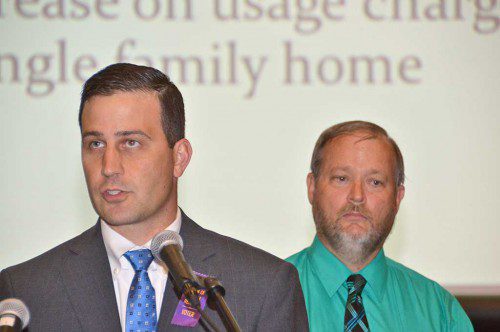Published in the June 16, 2016 edition

TOWN ADMINISTRATOR Michael Gilleberto and Water Superintendent Mark Clark at Town Meeting. (Bob Turosz Photo)
By BOB TUROSZ
NORTH READING – Joining the MWRA was the most important decision facing the voters at the June 6 annual town meeting. But once that (very important) piece of business was out of the way, the 133 residents in the High School’s Performing Arts Center still had work to do.
Before adjourning around 10 p.m., the meeting decided to:
- Name the main corridor in the new middle school extending from Main Street to the administrative offices in honor of Charles Jones, beloved teacher and administrator at the school for 38 years.
School Committee member Jerry Venezia said naming the main corridor is a well-deserved tribute to Jones, who was a teacher, vice principal and principal at the middle school from 1964 until he retired in 2002.
Even as vice principal and principal Jones always taught at least one history or social studies class, started the first mock trial program at the middle school and is well remembered for the summer out–of–school camping program he ran for 27 years, taking up to 45 students around the country for up to five weeks, with students and parents living together for up to 10,000 miles.
“I’ve known Mr. Jones for 30 years and he brought these students to places they can really see history come alive,” said Venezia.
High School teacher Claudia Brown thanked Mark, Lil and Jon Favreau for their tireless work on this project and the School Committee working with them. “Mr. Jones wishes to express his deep gratitude to all involved,” he said.
Former students seconded the sentiment. Chuck Russek of Londonderry, N.H., a 1980 graduate of NRHS, was in the class that made one of Jones’s first cross-country treks, in 1977. “It was one of the most memorable trips of my life. He was an extraordinary teacher, you couldn’t slack off, he taught with a passion I never saw again. He really did inspire a lot of people.”
One of the people Jones inspired was Peter Pappavaselio, of 49 Lindor Rd., who said Jones made a lasting impression and inspired him to become a teacher, also. Pappavaselio, who graduated from NRHS in 2001 said he can’t think of a more deserving individual.
The article to name to corridor in honor of Jones passed unanimously.
- The town operating budget for schools, general government and debt service for fiscal 2017, weighing a hefty $63.6 million, was accepted by the voters with no questions. The budget is in balance and continues a modified, acceptable standard of “Level Service” for the coming budget year, no doubt a big factor in the lack of opposition or even curiosity about the spending plan. The fiscal 2016 budget passed by Town Meeting a year ago was also voted on without questions for complaints.
- Strangely enough, (or perhaps not), there were plenty of questions and some grumbling about a $50,000 request for funds to design bathroom facilities for the Arthur J. Kenney Athletic Field in the center of town. The artificial turf field, which sees heavy use for school and youth sports as well as other events such as the Relay for Life and High School graduation, has lacked access to bathroom facilities since the old high school was torn down.
The $50,000 is for a study to get a solid idea of what bathroom facilities would cost and where they should be sited to comply with a state mandate to have bathroom facilities at the field.
Selectman Stephen O’Leary said the turf field has been out of compliance with state regulations for bathrooms at the field since 2009 but there has been a state waiver for most of that period. The state is willing to continue the waiver as long as the town shows progress in working toward the bathrooms, which could cost up to $500,000. The idea of the study is to take a thoughtful approach to the project and what the needs are. The game plan is to have the designs done in short order and be back at the next town meeting with a request for funds.
School Committee member Mel Webster said they’ve obtained cost estimates on a restroom building with and without a snack shack section. The other thing that has to be looked at is tying it in to the high school’s waste water treatment plant.
Planning Commission member Joe Veno said this should have been part of the new school construction. “Somebody should have known that we had to put restrooms down at that field. I’m really not happy with whoever missed the boat on this.”
O’Leary replied that the football field, track and spectator stands are not school property and could not be included in the high school project and there was no way the state would ever reimburse for the construction costs. “It was never going to be part of the project,” he said.
The $50,000 appropriation passed with a single dissenting vote – Veno’s.
Other articles acted on by the voters:
- Approval of Article 21, the annual capital equipment budget, totaling $887,041 for projects and new equipment such as: Fire Station interior upgrades, $198,830; Computer equipment replacement plan, $35,000; WiFi upgrade, $70,000; School Dept. special education van, $45,000; Replace three-quarter ton DPW pickup truck, $45,000; water conservation devices in town buildings, $25,279; Stormwater drain GIS mapping, $105,000; Hood School parking lot paving, $50,000; Flail mower for the DPW highway department, $30,000; water system distribution upgrades, $72,432; chlorine evaluation, water department, $150,000.
• Approval of $166,000 in retirement obligation for general government and school employees.
• Approval of Article 23, transferring $150,000 from the Overlay Surplus account to continue negotiations/litigation with PMA Consultants LLC and Dore and Whittier Architects for cost overruns in the building of the new high school and middle schools.
“We’re getting close to the point where we will potentially getting to court to resolve this issue,” said Selectmen Chairman Robert Mauceri.
• Approval of Article 24, $50,000 for miscellaneous repairs to town buildings including town hall, the senior center, the Damon Tavern and Flint Memorial Library.
• Approval of Article 25, putting aside $250,000 to cover OPEB costs (Other Post Employment Benefit) costs, representing 100 percent of required deposits for new hire employees.
• Approval of Article 27, $25,000 for consultant services in developing a master plan update for affordable housing and transportation.
• Articles 28–36 was a routine reauthorization of Revolving Funds for various departments: Conservation, the Damon Tavern, Rain Barrel program, Recycling Promotions, Elder Affairs, Emergency Management, Youth Services Library Activity Room and the Board of Health.
This is a purely routine authorization but for some reason the voters’ authorization was piqued this year, resulting in many questions about what the money is used for. They were told that Revolving Funds have nothing to do with tax funds. The revolving accounts are funded with receipts paid by those who use the services of the the various departments and then the receipts are used to offset the departments’ operations.
• Article 37, sponsored by the Community Planning Commission, will allow the CPC to use subdivision bonds to complete unfinished work in subdivisions after the approved deadlines have passed.
The meeting wrapped up with Article 38, the strangest article on the warrant and the only one to be defeated. It was a citizens’ petition put on the warrant by a non–resident that would have completely changed the way the town handles tickets resulting from traffic infractions.
The Selectmen made the motion to accept the article and then unanimously asked the voters to defeat it and the Finance Committee agreed. Selectmen Chairman Mauceri said the individual responsible for the language of the article, which was four pages long, got it onto the town meetings in a number of other communities. The sponsor then asked that it be withdrawn. Town Counsel advised the Selectmen the article would most likely be rejected by the Attorney General.
Instead, the Selectmen asked the voters to defeat the article so it cannot be brought back before the voters for at least another year.




